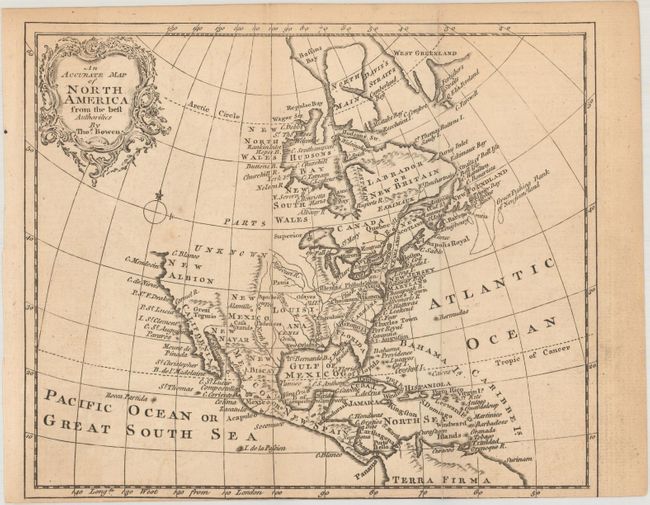Subject: Colonial North America
Period: 1773-95 (circa)
Publication:
Color: Black & White
A. An Accurate Map of North America from the Best Authorities, by Thomas Bowen, from The General Gazetteer..., circa 1773 (9.3 x 7.7"). This small, handsome map first appeared in Richard Brookes' General Gazetteer in 1773. The colonies are delineated along the East Coast, with a large Lousiana Territory beyond the Mississippi. Santa Fe, Alamillo, and Casa Grande appear in the territory of New Mexico. The area of present-day Northern California is here called New Albion. There is no defined northwestern coast to the continent, with the area labeled Parts Unknown. The mythical western kingdom of Great Teguaio is also named. Off the coast of Newfoundland, the Great Fishing Bank is identified. Ref.: McCorkle (18th C. Geography Books) #22-3. Condition: A nice impression issued folding with light toning and a touch of soiling. The neatline has been trimmed away at bottom right.
B. The United States of America, According to the Treaty of Peace of 1784, by John C. Russell, circa 1795 (7.9 x 7.2"). A very early map that details the fledgling states and the Indian lands east of the Mississippi River. The map is particularly interesting for the depiction of the Revolutionary War Bounty Land Grants. Ohio is a small area labeled Ohio Company and Donation Lands with no sign of the other bounty grants named on Russell's larger, derivative map. Other interesting designations west of Ohio bear the labels Illinois Company, Wabash Company, Army Lands, and New Jersey Company. The area northeast of the upper Mississippi River is largely unorganized with a few rivers, forts, and settlements. The map locates Detroit, the Lake of the Woods, and Upper and Lower Iowa in this region. Army Lands are located in both Kentucky (unnamed) and in the Tennessee Government. Tennessee had recently split from western North Carolina and would soon gain statehood. Georgia is listed at the fifteenth state and appears to extend to the Mississippi River. Florida is divided into east and west regions. Under the control of Spain, Florida had been ceded by England to the Spanish in gratitude for their neutrality during the American Revolutionary War. Various Indian tribes, forts, and villages are indicated throughout. The Twenty Leagues Line is drawn in the Atlantic. Near the left margin is the "References to the States," listing only fifteen. The title misdates the Treaty of Paris to 1784, instead of 1783. Ref: McCorkle #795-11. Condition: Issued folding with some light soiling.
References:
Condition: B+
See description above.



